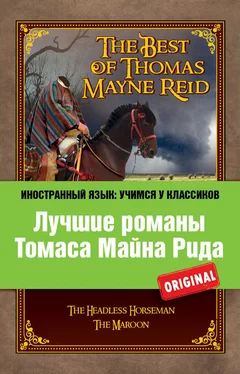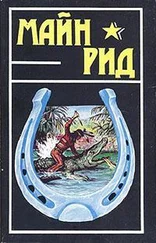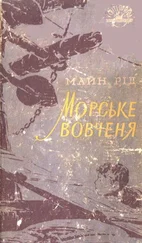In her anguish the young Creole pronounced the last words aloud.
Only the name was heard by Judith Jessuron; but they fell upon her ear with fearful effect, piercing through her heart like a poisoned arrow. If she had any doubts about the purpose of Kate’s presence, that word had decided them. The Creole had now declared it with her own tongue!
On the instant a thought, dread and dire, commenced taking shape in the heart of the jealous woman. She felt her bosom stirred to a purpose bold and black as hell itself.
That purpose was nothing less than the destruction of her rival – the death of Kate Vaughan!
The circumstances suggested the mode. The young Creole was standing upon the escarpment of the cliff – scarce three feet from its edge. A slight push from behind would project her into eternity!
Not much risk either in the committal of the crime. The bushes below would conceal her body – at least, for a length of time; and, when found, what would be the verdict? What could it be, but felo-de-se [570] ?
The circumstances would give colour to this surmise. Even her own father might fancy it, as the consequence of his forcing her to be wedded against her will. Besides, had she not stolen surreptitiously from the house, taking advantage of an opportunity when no eye was upon her?
Other circumstances equally favoured the chances of safety. No one seemed to know that Kate had come up to the Jumbé Rock; and not a soul could be aware that she, Judith, was there: for she had neither passed nor met anyone by the way.
No eye was likely to be witness of the act. Even though the forms of the actors might be descried from the valley below, it would be at too great a distance for anyone to distinguish the character of the proceeding. Besides, it was one chance in a thousand if any eye should be accidentally turned towards the summit of the mountain. At that hour the black labourers in the fields were too busy with their task to be allowed the freedom of gazing idly upon the Jumbé Rock.
With a fearful rapidity coursed these thoughts through the mind of the intending murderess – each adding fresh strength to her horrible purpose, and causing it to culminate towards the point of execution.
Her jealousy had long since become a strong passion, to which she had freely abandoned her soul. Already was it yearning for revenge; and now that an opportunity seemed to offer for gratifying it, she could no longer restrain herself. The chance was too tempting – the demoniac desire became uncontrollable.
Casting a glance down the ravine to make sure that no one came that way, and another towards Kate to see that her face was still turned away, Judith stole softly out of the bushes and mounted upon the rock.
Silently, as treads the tigress approaching her prey, did she advance across the platform towards the spot where stood her intended victim, utterly unconscious of the dread danger that was so nigh.
Was there no voice to warn her?
There was – the voice of Smythje!
“Aw-haw, deaw Kate! that yaw up there on the wock! Aw, ba Jawve! what a pwecious chase aw’ve had aftaw yaw! There isn’t a bweath left in my body! Haw! haw!”
Judith heard the voice, and, like a cheated tigress, was about to retreat to her lair, when Kate, half facing about, compelled her to keep her ground. With the suddenness of a thought she had changed her terrific attitude, and, as the eyes of the Creole rested upon her, she was standing with her arms hanging negligently downward, in the position of one who had just stepped forward upon the spot.
Kate beheld her with surprise, not unmixed with alarm; for the wild look that still lingered in the eye of the disappointed and balked murderess could not escape observation.
Before either could say a word, the voice of Smythje was again heard speaking from below.
“Deaw queetyaw, I am coming! Aw shall pwesently be up,” continued he; his voice, constantly changing its direction, proclaiming that he continued to advance round the rock towards the ravine in the rear.
“I beg your pardon, Miss Vaughan,” said the Jewess, with a sweeping curtsey and a cynical glance towards Kate; “most emphatically I beg your pardon. The second time I have intruded upon you in this delightful place! I assure you my presence here is altogether an accident; and, to prove that I have no desire to interfere, I shall bid you a very good morning!”
So saying, the daughter of Jacob Jessuron turned towards the downward path, and had disappeared from the platform before Kate could command words to express either her astonishment or indignation.
“Ba Jaw-aw-ve!” gasped Smythje, breathless, on reaching the platform. “Had yaw company up heaw? Shawly aw saw some one gawing out fwom the wavine – a lady in a widing dwess!”
“Miss Jessuron has been here.”
“Aw, Miss Jessuwon – that veway wemarkable queetyaw! Gawing to be mawied to the – yaw cousin, ’tis repawted. Ba Jawve, she’ll make the young fellaw a fine wife, if she dawn’t want too much of haw awn way. Haw! haw! what do yaw think about it, deaw Kate?”
“I have no thoughts about it, Mr Smythje. Pray let us return home.”
Smythje might have noticed, though without comprehending it, the anguished tone in which these words were uttered.
“Aw, veway well. A’m weady to go back. But, deaw Kate, what a womp yaw are, to be shawr! Yaw thought to pway me a twick, like the young bwide in the ‘Misletaw Bough.’ Haw! haw! veway amusing! Nevaw mind! Yaw are not so unfawtunate as that fair queetyaw was. I saw yawr white scarf amid the gween twees, and that guided me to yaw seqwet hiding-place. Haw! haw!”
Little suspected Smythje how very near had been his affianced to a fate as unfortunate as that of the bride of Lovel [571] – as little as Kate that Smythje had been her preserver.
Chapter 15
Cynthia’s Report
Cynthia was not slow in responding to the summons of the Jew, who possessed an influence over her which, if not so powerful, was also less mysterious than that wielded by the myal-man, since it was the power of money . The mulatta liked money, as most people do, and for the same reason as most – because it afforded the means for indulging in dissipation, which with Cynthia was a habit.
Very easily did she find an opportunity for paying a visit to the penn – the more easily that her master was absent. But even had he been at home, she would have had but little difficulty in framing an excuse, or, rather, she would have gone without one.
In the days of which we write, slavery had assumed a very altered phase in the West Indies – more especially in the Island of Jamaica. The voices of Wilberforce and Clarkson had already reached the remotest corners of the Island, and the plantation negroes were beginning to hear the first mutterings of the emancipation. The slave trade was doomed; and it was expected that the doom of slavery itself would soon be declared.
The black bondsmen had become emboldened by the prospect; and there was no longer that abject submission to the wanton will of the master, and the whip of the driver, which had existed of yore. It was not uncommon for slaves to take “leave of absence” without asking it – often remaining absent for days; returning without fear of chastisement, and sometimes staying away altogether. Plantation revolts had become common, frequently ending in incendiarism and other scenes of the most sanguinary character; and more than one band of “runaways” had established themselves in the remote fastnesses of the mountains; where, in defiance of the authorities, and despite the preventive service – somewhat negligently performed by their prototypes, the Maroons – they preserved a rude independence, partly sustained by pilfering, and partly by freebooting of a bolder kind. These runaways were, in effect, playing a rôle , in complete imitation of what, at an earlier period, had been the métier of the original Maroons; while, as already stated, the Maroons themselves, employed upon the sage but infamous principle of “set a thief to catch a thief,” had now become the detective police of the Island.
Читать дальше
Конец ознакомительного отрывка
Купить книгу











